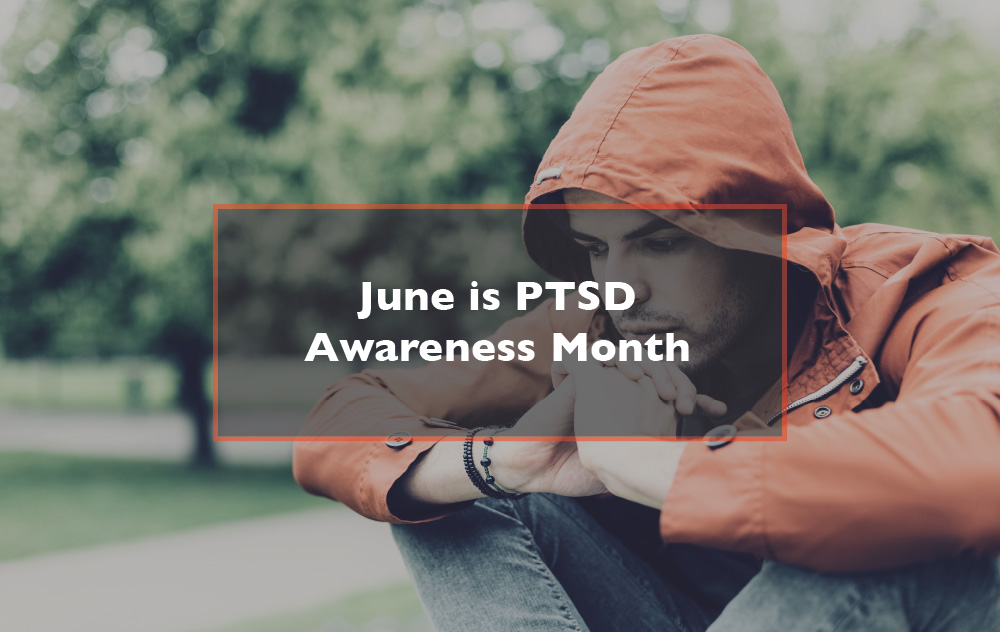June is PTSD Awareness Month

June is PTSD (Post-Traumatic Stress Disorder) Awareness Month, a time to shed light on the impact of this mental health condition. PTSD can affect anyone who has experienced or witnessed a traumatic event, such as combat, violence, accidents, or natural disasters.
It is important to recognize that individuals with PTSD often face additional challenges, including substance abuse. The intersection between PTSD and substance abuse can be difficult to navigate. It sometimes requires the support of loved ones to get through it.
Understanding the Connection.
PTSD and substance abuse often coexist, forming a complex and challenging cycle. The connection between the two can happen due to several factors:
Self-Medication:
Individuals with PTSD may use drugs or alcohol to cope with overwhelming emotions, flashbacks, nightmares, or other symptoms. Using substances to manage may provide temporary relief, numbing the pain associated with traumatic memories.
Escapism:
Substance abuse can temporarily escape the troubling symptoms of PTSD, offering a way to avoid intrusive thoughts, anxiety, or depression. Unfortunately, this short-lived escape can lead to a vicious cycle of addiction.
Increased Vulnerability:
Trauma alters brain chemistry and can make individuals more vulnerable to addiction. The impact of traumatic experiences on the brain’s reward system can heighten the risk of developing substance abuse issues.
Co-Occurrence:
PTSD and substance abuse frequently happen at the same time as other mental health conditions such as depression, anxiety disorders, or borderline personality disorder, making the recovery process more challenging.
Supporting a Loved One with PTSD and Substance Abuse.
If someone you care about faces the tough challenges of PTSD and substance abuse, the support and understanding of family and loved ones can make a difference. Here are some important ways you can help:
Expand Your Knowledge:
Learn about PTSD and substance abuse to better understand your loved one is experiencing. Understanding the symptoms, triggers, and available treatments can help you provide informed support.
Offer a Listening Ear:
Be patient and compassionate when your loved one wants to share their thoughts or emotions. Allow them to express their feelings without judgment or pressure. Sometimes, a sympathetic ear can be incredibly healing.
Encourage Professional Help:
Encourage your loved one to seek professional help from therapists, counselors, or support groups specializing in trauma and addiction. Professional guidance can provide helpful ways to cope, personalized treatment plans, and a safe space for expression.
Promote Healthy Coping Methods:
Encourage your loved one to explore healthier alternatives to substance abuse, such as exercise, meditation, journaling, or participating in creative activities. These positive coping methods can help reduce stress, anxiety, and the urge to self-medicate.
Be Patient and Nonjudgmental:
The path to recovery can be challenging and full of ups and downs. Understand that setbacks may occur, and relapses are a part of the journey. Offer your support without criticism or blame, reminding them of your commitment to their well-being.
Foster a Supportive Environment:
Create a safe, nurturing environment that promotes open communication, trust, and understanding. Encourage your loved one to build healthy relationships and surround themselves with positive and supportive individuals who make them feel valued and accepted.
Take Care of Yourself:
Supporting someone with PTSD and substance abuse can be emotionally draining. Make self-care a priority, seek your support network, and set boundaries to maintain your well-being. Remember, you cannot pour from an empty cup.
Dealing with PTSD and substance abuse can be difficult, but recovery is possible with understanding, compassion, and support. Think Before You Sleep is a movement where awareness and education empower. Please reach out to us for more resources.

